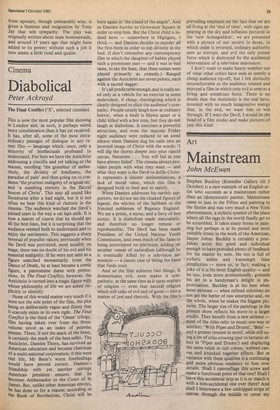Cinema
Diabolical
Peter Ackroyd
The Final Conflict ('X', selected cinemas) This is now the most popular film showing in London and, as such, is perhaps worth more consideration than it has yet received. It has, after all, some of the most extraordinary passages of dialogue in any recent film — language which, once, only a minority of intellectuals professed to understand. For here we have the Antichrist addressing a crucifix and yet talking to the masses, extolling 'the grandeur of melancholy, the divinity of loneliness, the Paradise of pain' and then going on to condemn 'the prurient malignity of original sin' and 'a numbing eternity in the flaccid bosom of Christ'. This may all sound like Swinburne after a bad night, but it is not often we hear this kind of rhetoric in the cinema. The audience watched the Devil's Pained tears in the way a cat laps milk. It is now a matter of course that he should get all the best lines, but it is surprising that the audience seemed both to understand and to enjoy the sentiments. This suggests a sharp reversal of populist values; previously when the Devil was portrayed, most notably on stage, there was no doubt of his evil and his essential malignity. If he were not seen as a figure snatched momentarily from the Dance of Death, he at least became a comic figure, a pantomime dame with pretensions. In The Final Conflict, however, the Antichrist is turned into a tragic figure with Whose philosophy of life we are asked implicitly to identify.
None of this would matter very much if it were not the sole point of the film, the plot being so deliberately vague and flimsy that it scarcely exists in its own right. The Final Conflict is the third of the 'Omen' trilogy, film having taken over from the threevolume novel as an index of popular esteem. Three, if not the mark of the beast, Is certainly the mark of the best-seller. The Antichrist, Damien Thorn, has survived an American education and become chairman of a multi-national corporation; if this were real life, Mr Benn's worst forebodings would have proved correct. Damien's friendship with yet another corrupt American president ensures that he becomes Ambassador to the Court of St James. But, unlike other American envoys, he has done so for a reason: according to the Book of Revelations, Christ will be born again in 'the island of the angels'. And so Damien hurries to Grosvenor Square in order to stop him. But the Christ child is indeed born — somewhere in Highgate, I think — and Damien decides to murder all the first-born in order to nip divinity in the bud. (I don't remember any contemporary film in which the slaughter of babies played such a prominent part — and it was in bad taste, to say the least, that these scenes were played primarily as comedy.) Ranged against the Antichrist are seven priests, each with a sacred dagger.
It's all predictable enough, and is really used only as a vehicle for an exercise in some malevolent, if cheap, theologising which is clearly designed to elicit the audience's sympathy. People simply laugh now at ordinary horror, when a body is blown apart or a child killed with a hot iron, but they do not laugh at diabolism. It exercises a powerful attraction, and even the raucous Friday night audience were reduced to an awed silence when Damien dug his nails into an inverted image of Christ with the words: 'I will dig the thorns deeper into your rancid carcas, Nazarene . . . You will fail as you have always failed'. The cinema always provides people with what they want — and what they want is the Devil to defile Christ. It represents a sinister antinomianism, a lack of moral value, which this film is designed both to feed and to satisfy.
When Damien addresses his earthly supporters, we do not see the cloaked figures of legend, the witches of the Sabbath or the frenzied noblemen of Regency England. We see a priest, a nurse, and a bevy of boy scouts. It is diabolism made naturalistic, and therefore no longer remote or reprehensible. The Devil has been made President of the United Nations Youth Commission, and owes much of his fame to being interviewed on television, adding yet another veneer of naturalism (although he is eventually killed by a television announcer — a classic case of biting the hand that feeds you).
And so the film achieves two things. It domesticates evil, even makes it sympathetic, at the same time as it turns matters of religion — even that natural religion which still talks of evil and of good — into a matter of jest and rhetoric. With the film's prevailing emphasis on the fact that we are all living at the 'end of time', with signs appearing in the sky and inflation pictured as the 'new Armageddon', we are presented with a picture of our society in decay, in which order is reversed, ordinary authority seen as corrupt, and evil the only potent force which is destroyed by the accidental intervention of a television announcer.
I don't want to make heavy weather out of what other critics have seen as merely a cheap audience rip-off, but I felt distinctly uncomfortable as the audience relaxed and enjoyed a film in which only evil is seen as a living and wondrous force. There is no doubt that the Antichrist is the real hero, invested with so much imaginative energy that, in the end, we want him to win through. If I were the Devil, I would be the head of a film studio and make pictures of just this kind.






































 Previous page
Previous page